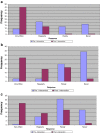Improving pharmacy practice through public health programs: experience from Global HIV/AIDS initiative Nigeria project
- PMID: 24255831
- PMCID: PMC3824707
- DOI: 10.1186/2193-1801-2-525
Improving pharmacy practice through public health programs: experience from Global HIV/AIDS initiative Nigeria project
Abstract
Background: The use of medicines is an essential component of many public health programs (PHPs). Medicines are important not only for their capacity to treat and prevent diseases. The public confidence in healthcare system is inevitably linked to their confidence in the availability of safe and effective medicines and the measures for ensuring their rational use. However, pharmacy services component receives little or no attention in most public health programs in developing countries. This article describes the strategies, lessons learnt, and some accomplishments of Howard University Pharmacists and Continuing Education (HU-PACE) Centre towards improving hospital pharmacy practice through PHP in Nigeria.
Method: In a cross-sectional survey, 60 hospital pharmacies were randomly selected from 184 GHAIN-supported health facilities. The assessment was conducted at baseline and repeated after at least 12 months post-intervention using a study-specific instrument. Interventions included engagement of stakeholders; provision of standards for infrastructural upgrade; development of curricula and modules for training of pharmacy personnel; provision of job aids and tools amongst others. A follow-up hands-on skill enhancement based on identified gaps was conducted. Chi-square was used for inferential statistics. All reported p-values were 2-tailed at 95% confidence interval.
Results: The mean duration of service provision at post-intervention assessment was 24.39 (95% CI, 21.70-27.08) months. About 16.7% of pharmacies reported been trained in HIV care at pre-intervention compared to 83.3% at post-intervention. The proportion of pharmacies with audio-visual privacy for patient counseling increased significantly from 30.9% at pre-intervention to 81.4% at post-intervention. Filled prescriptions were cross-checked by pharmacist (61.9%) and pharmacy technician (23.8%) before dispensing at pre-intervention compared to pharmacist (93.1%) and pharmacy technician (6.9%) at post intervention. 40.0% of pharmacies reported tracking consumption of drugs at pre-intervention compared to 98.3% at post-intervention; while 81.7% of pharmacies reported performing periodic stock reconciliation at pre-intervention compared to 100.0% at post-intervention. 36.5% of pharmacies were observed providing individual counseling on medication use to patients at pre-intervention compared to 73.2% at post-intervention; and 11.7% of pharmacies had evidence of monitoring and reporting of suspected adverse drug reaction at pre-intervention compared to 73.3% at post-intervention. The institution of access to patients' clinical information by pharmacists in all pharmacies at post-intervention was a paradigm shift.
Conclusion: Through public health program, HU-PACE created an enabling environment and improved capacity of pharmacy personnel for quality HIV/AIDS and TB services. This has contributed in diverse ways to better monitoring of patients on pharmacotherapy by pharmacists through access of pharmacists to patients' clinical information.
Keywords: HIV/AIDS; Nigeria; Patients; Pharmaceutical care; Public health programs.
Figures



References
-
- American Society of Health-System Pharmacists ASHP guidelines on pharmacist-conducted patient education and counseling. Am J Health-Syst Pharm. 1997;54:431–434. - PubMed
-
- Erah PO. The changing roles of pharmacists in hospital and community pharmacy practice in Nigeria. Trop J Pharm Res. 2003;2(2):195–196.
-
- Erah PO, Nwazuoke JC. Identification of standards for pharmaceutical care in Benin City. Trop J Pharm Res. 2002;1(2):55–66.
LinkOut - more resources
Full Text Sources
Other Literature Sources

